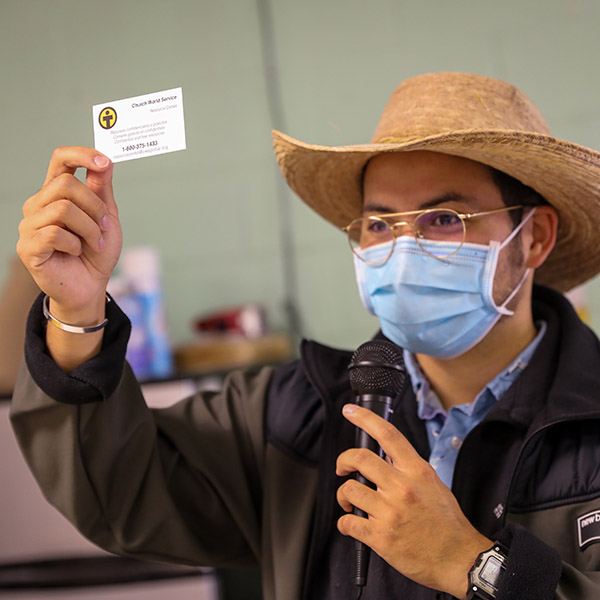Stories of Change

People seeking asylum receive cards like this one in shelters along the U.S.-Mexico border. The call center number is on the card.
Answering the Call of People Seeking Asylum
For a moment, put yourself in the shoes of someone seeking asylum who has just arrived in an American city like Miami, New York or Seattle. You’ve left your home behind because there was a threat so serious that you knew you couldn’t stay. You’ve been through a long, exhausting and dangerous journey to the United States. Then you spent time in a detention or processing center on the U.S.-Mexico border before being released with a notice that you’re expected to appear in court in a few months for your asylum hearing soon.
You’ve made it to relative safety, but now there is a wall of questions in front of you. Your legal hearing was scheduled in a court near the border, but you’re thousands of miles away. How are you going to make that work? More urgently, how are you going to feed yourself a week from now when the money in your pocket runs out? How do you communicate with your new neighbors if you only speak a limited amount of English? What happens when you’re no longer able to stay with relatives? How long will it be before you see your partner, since you got separated when you came across the border? How are you supposed to make a living? What happens if you get sick? Are you legally allowed to enroll your children in school? Is it possible to get counseling to help you face trauma you’ve experienced?
A million questions, and seemingly no answers. That is, until CWS asked one more question that had the potential to be a game-changer: what if there was a number that you could call and someone would help you?
That’s what we set out to do. CWS now operates a national call center that people seeking asylum and other new neighbors can call to ask these very questions, no matter where they are in the country. Our mission is simple: answer.
We do outreach along the U.S.-Mexico border and in other places around the country to get our number into the hands of people seeking asylum as they arrive. Our team of specialists have answered more than 7,000 calls from these new neighbors, and they’ve answered countless questions along the way.
Callers ask about anything and everything, but there are four themes that are the most common:
– Legal help: Just like in the example above, lots of people seeking asylum have their asylum hearings scheduled for courts on the border. Most leave the border, though, to meet relatives or friends in other states. Our specialists help these callers understand how to move their hearing to a court near them. They can also provide other valuable legal information about how the asylum process works. For more in-depth cases that require legal advice, we refer callers to our legal team or other services.
– Food: People seeking asylum aren’t eligible for public benefits, so how can they feed themselves and their families while they are getting their feet under them? This is often an urgent question that comes from hungry callers. Our specialists have apps and maps with information about every food bank in the United States. They can quickly find a food bank near the caller where they can get free food.
– Medical care: Without being eligible for public benefits, how can people seeking asylum get help if they are sick? Or how can they get vaccines for their children to enroll them in school? Our specialists connect callers to free clinics near them that may be able to help. They can also offer legal information relating to benefits.
– Shelter: Most people seeking asylum move to communities where they have friends or relatives, and they stay with them. That doesn’t always work out, though, or it’s not viable in the long term. Sometimes people call with urgent needs, seeking a safe place to stay that night. Other times they are looking for programs that can help them secure longer-term housing options. Either way, our specialists connect callers to services available in their area.
Of course, our team also handles calls on other topics. One time a man called because he had accidentally left his government immigration documents on the bus to the airport. Without those documents, he would have been stranded in the airport he was calling from. Our team helped track down the bus and get him his papers back. Another time, an LGBTQ+ community member called to ask about accessing hormone treatments. Our specialist was able to do some online research during the call to find a service to connect the caller to. When a pregnant woman called because she was experiencing health concerns related to her pregnancy and her husband was still in detention, our specialist explained that if this was an emergency, she should call 9-1-1 or go to the emergency room of the nearest hospital. They also gave her information on local health centers and organizations in her community that work with newly-arriving immigrants. She called back a few months later to let us know that her son was born safely and that she and her son had been reunited with her husband. No matter what challenge someone is facing, we work to get answers, information and additional resources.
People arrive in the United States every day in search of safety and asylum. They often need a bit of help as they navigate a complex legal and benefits system on their path to thriving in their new communities. We’re proud to answer their call.
